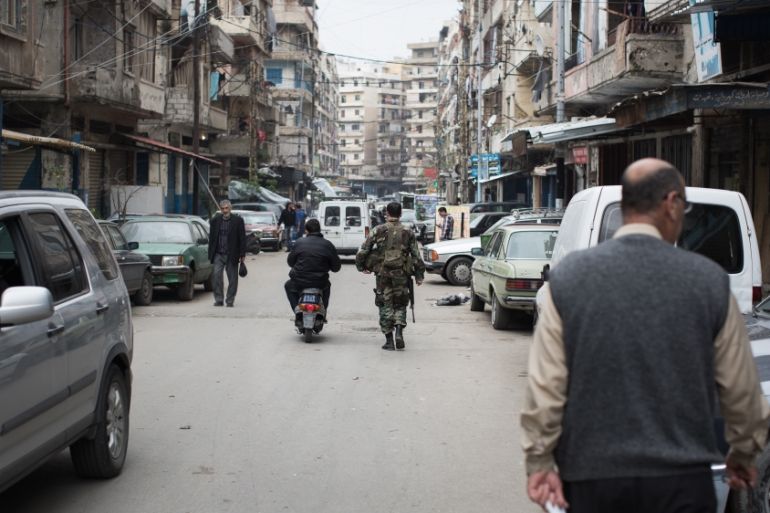Lebanon military tribunal sentences armed group leaders
Tripoli residents divided on security measures and arrest campaigns in city plagued by fighting and sectarian tension.

A Lebanese military tribunal has handed down sentences to the leaders and members of several armed groups in the country’s northern coastal city of Tripoli.
The arrests of armed groups’ leaders and fighters in recent months is part of a broader security plan that the Lebanese military introduced in Tripoli in April 2014, hoping to prevent more fighting and ease sectarian tensions.
Keep reading
list of 4 itemsHong Kong’s first monkey virus case – what do we know about the B virus?
Why will low birthrate in Europe trigger ‘Staggering social change’?
The Max Planck Society must end its unconditional support for Israel
Local residents, however, are deeply divided on the Lebanese army’s security measures and arrest campaigns in the city.
|
|
| Inside Story – How exposed is Lebanon to Syrian war? |
The military tribunal ruled on Friday that Ziad Saleh, the leader of a Tripoli-based armed group with ties to Syrian rebels, will spend three years in jail, according to local media reports.
Mahmoud Hallouq and Saad Masri, leaders of other armed groups, were sentenced to three years and two-and-a-half years in jail, respectively.
Friday’s military tribunal also tried several fighters in absentia, with some being given two-year jail sentences and others 15 years of hard labour.
Speaking to Al Jazeera recently in Tripoli, Muhammad al-Sarraj, a merchant in the Bab al-Tabbaneh whose store was damaged several times during fighting, praised the campaign to arrest the fighters.
“I’d say 90 percent of the problems [related to security] have improved here,” he said.
Behind him, large posters bearing the faces of three young men killed in local clashes – each of them holding up AK-47 assault rifles – are plastered to the wall.
RELATED: Meet the Lebanese fighting next door in Assad’s army
The armed groups are active in Tripoli’s Sunni-majority Bab al-Tabbaneh, where clashes are regular between local fighters and armed groups in Jabal Mohsen, a nearby area with residents belonging to Syrian President Bashar al-Assad’s Alawite sect.
Though fighting between the two communities has been consistent since 2008, it has intensified since the outbreak of the Syrian war in 2011.
More than a dozen bouts of intense political violence – either between Bab al-Tabbaneh and Jabal Mohsen, or between Bab al-Tabbaneh armed groups and the Lebanese army – occurred between June 2011 and the beginning of 2015.
Many fighters from Bab al-Tabbaneh have also fought in opposition groups next door in Syria, while fighters from Jabal Mohsen have served in the Syrian government’s army or fought in pro-Assad militias.
‘Poorest communities’
Mario Abou Zeid, a political analyst at the Carnegie Middle East Centre in Beirut, explained that while Tripoli’s political divisions are sectarian on the surface, they are rooted in and fuelled by socioeconomic grievances.
“There is a lot of poverty and little state activity on social services level,” he told Al Jazeera, adding that Bab al-Tabbaneh is one of the poorest communities in Lebanon. “This makes it easy for armed groups, especially Islamists, to recruit fighters.”
Nonetheless, Abou Zeid said that security forces have prevented more fighting by arresting many members of armed groups since the beginning of the year.
“Generally speaking, the army’s crackdown on sleeping cells connected to al-Nusra Front and the Islamic State [of Iraq and the Levant] in Bab al-Tabbaneh has been successful,” he said.
RELATED: How exposed is Lebanon to Syrian war?
Standing outside a mosque on Syria Street – the dividing line between the rival neighbourhoods – Sheikh Ahmed Dirbassi accused the Lebanese army of discriminating against Sunni residents.
Bullet holes line the walls of homes up and down Syria Street, while some bear holes caused by grenades and shells.
![Syria Street has been the front-line for fighting between Jabal Mohsen and Bab al-Tabbaneh [Dylan Collins/Al Jazeera]](/wp-content/uploads/2015/10/3ce382ebceaf481bb00035794ff55f21_18.jpeg)
“These times are worse than the days of the Syrian occupation,” he told Al Jazeera, referring to that country’s 29-year military occupation of large swaths of Lebanon that ended in 2005.
“Being a Muslim is enough to make you a ‘terrorist’ now,” Dirbassi continued. “You can go in the mosque to pray and come out to be arrested.”

Jabal Mohsen arrests
Sitting in a cafe in Jabal Mohsen, Hassan, a 30-year-old resident who only provided his first name, said that “Alawites here are always ready for the next fight”.
“We have a lot of fighters here,” he told Al Jazeera, “but we are standing behind the Lebanese army and support it when it arrests extremists.”
“If the Lebanese army ever pulls out of here, we will manage and take up our arms to preserve our existence and defend our honour and land.”
The army’s arrests have also extended to Jabal Mohsen, where locals say armed groups are geared up for the next bout of violence.
Ali Fodda, spokesman for the Assad-supported Arab Democratic Party in Jabal Mohsen, said that at least 50 fighters from the neighbourhood’s Alawite militias were locked up in Lebanese jails, as of September.
Another 100 leaders and fighters, including Arab Democratic Party leader Rifaat Eid, have also taken refuge in Syria to avoid arrest.
Lebanon’s Tripoli: The transit hub for Syrian refugees
Fodda argued that the security measures in Tripoli have not gone far enough. “The measures should be comprehensive and include political, social and economic reconciliation,” he told Al Jazeera.
Ali, a 22-year-old from Jabal Mohsen, does not think the army’s arrests will be able to prevent more bloodshed.
“The army’s security plans aren’t going to stop our fighting, and there’s another battle coming soon,” he told Al Jazeera. “We’ve been fighting for a long time. It’s not going to stop anytime soon.”
Follow Patrick Strickland on Twitter: @P_Strickland_